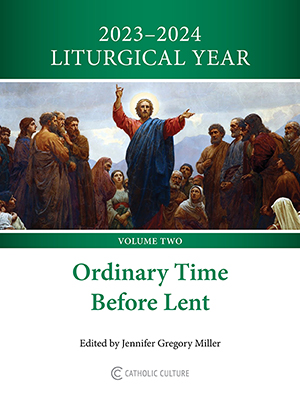Catholic Activity: Corpus Christi Hymns

Describes the traditional hymns sung on the Feast of Corpus Christi.
DIRECTIONS
The solemnity of the Corpus Christi festival is enhanced by the additional use of Alleluia in the prayers of the liturgy (as at Easter time). Saint Thomas Aquinas has magnificently expressed the jubilant character of the day in his famous hymns, especially in Sacris Solemniis, which is recited during the matins of the feast and sung at the procession:
Sacris solemniis juncta sint gaudia,
Et ex praecordiis sonent praeconia;
Recedant vetera, nova sint omnia,
Corda, voces et opera.Great is the festive day, joyful and jubilant,
Let us with loving hearts offer the song of praise;
Freed from the sinful past, may we renew in grace
All our thoughts and words and deeds.
The fifth stanza of Sacris Solemniis has been used for centuries as a separate hymn in honor of the Blessed Sacrament. As Panis Angelicus (Bread of the Angels) it is known and cherished widely among Christians of many denominations. . . . Another hymn by Saint Thomas, Pangue Lingua Gloriosi Corporis Mysterium (Praise, O tongue, the mystery of the glorious Body), contains the two stanzas which are sung all over the world at every Eucharistic service, Tantum Ergo and Genitori. The best known, and perhaps most beautiful, of any musical settings has remained the Gregorian chant tune (Mode III). For the Lauds of Corpus Christi, Aquinas wrote the hymn Verbum Supernum Prodiens (The Divine Word coming forth). Again the last stanza preceding the customary conclusion in praise of the Trinity has become a favorite song and prayer in itself:
O salutaris hostia,
Quae caeli pandis ostium,
Bella praemunt hostilia:
Da robur, fer auxilium.O saving host, O bread of life,
Thou goal of rest from pain and strife,
Embattled are we, poor and weak:
Grant us the strength and help we seek.
Finally, there is the sequence of the Mass, Lauda Sion Salvatorem (Sion, praise thy Lord and Saviour). Saint Thomas enumerates in unmistakable words the main truths of Christ's revelation and the Church's teaching about the Holy Eucharist. In many countries a translation of this sequence into the vernacular is sung by the people as a popular church hymn in honor of the Blessed Sacrament.
The most famous nonliturgical hymn in honor of the Blessed Sacrament is the ancient prayer poem Ave Verum Corpus (Hail, true Body). It appeared first in manuscripts at the end of the fourteenth century and is ascribed to Pope Innocent VI (1362). Its original purpose was to serve as a private prayer for the faithful to be said at the elevation of the sacred Host during Mass (In elevatione Corporis Christi). This jewel of sacred poetry soon spread through most Catholic countries of Europe.
Activity Source: Handbook of Christian Feasts and Customs by Francis X. Weiser, S.J., Harcourt, Brace and Company, New York, 1958







